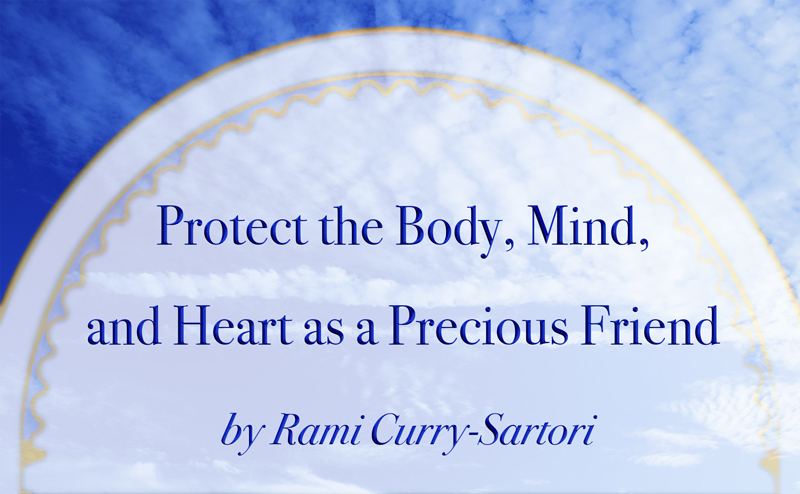Protect the Body, Mind, and Heart as a Precious Friend
by Rami Curry-Sartori
“Be in the Temple” Satsang in Celebration of Raksha Bandhan
Live Video Stream in the Siddha Yoga Universal Hall
Saturday, August 1, 2020

As we contemplate protection on this occasion of Raksha Bandhan, let’s consider what we, having received the grace and teachings of our Guru, can do to protect what we’ve been granted as human beings. We’ve been given this amazing apparatus: this body, this mind, this heart. What valuable assets we have been entrusted with! How do we take responsibility to protect them so that we can be of true service to our world and realize our life’s highest purpose?
When we protect the well-being of our body, we have vibrant energy to engage in sadhana and to offer service to humanity for years to come. When we protect the health of our mind, we access our inner wisdom and proceed courageously even in the face of difficulties. When we protect our heart, our emotional being, we are able to process our many emotions and transmute them into positive energy that we can share through our interactions with others.
How do we go about protecting the state of our body, mind, and heart? I want to share with you a teaching that I find deeply illuminating and inspiring. It’s from the Katha Upanishad, and Gurumayi and Baba often referred to it in their talks. The Upanishad says: “Both the beneficial and the pleasurable present themselves to a human being. The wise person assesses them, notes the difference, and chooses the beneficial over the pleasurable. But the unwise person chooses the pleasurable rather than what is beneficial.”1 This verse teaches us to exercise the power of our own viveka, discrimination. Viveka is our awakened ability to discern what will be beneficial in any given situation.
We learn to identify and choose that which is uplifting in the long term for all involved, instead of that which may only provide momentary relief or gratification of our personal desires. Building the ability to choose the beneficial takes practice, however. Just like growing a muscle, our capacity to discriminate grows with repetition, one moment, one experience, one interaction at a time.
How can we practice this, moment by moment, in our lives? As we engage in self-inquiry and shed light on our inner experience, we gain the power to consciously choose how we want to lead our lives. For example, to protect our body, we can attune to the signals our body gives us all day. We can study the state of our breath, muscles that are holding or relaxed, or fluctuations in our energy level. As we become familiar with and honor this communication from our body, we can act wisely to attend to our body’s needs, choose nourishment over indulgence, and keep the energy flowing.
In order to protect our minds, we can be savvy to the nature of the mind. The mind is the storehouse of our life experiences, beliefs, and perceptions and how we have digested them, for better or for worse. As current experiences reactivate these thought patterns, we can recognize the source of our thoughts. Understanding how our own mind works can free us from cycles of habitual reaction. We can reflect in any moment, “What’s going on in my mind? Where do these thoughts come from, and where are my thoughts leading me? Are they taking me toward my goals?” If not, take time to reflect, clarify your destination, and take hold of the reins of your mind.
And how do we protect our emotional being, our heart? When we notice our emotions pulling us off-center, we can practice gentle discrimination. Rather than battle with them, we can step back, breathe, give ourselves time to assimilate them, and then guide our energies back home to the source of our being, the inner Self.
So much is happening in the world around us. How this impacts us on the inside is unique to each of us. It is in our power to be lovingly vigilant about the state of our body, mind, and heart, caring for them as we do our dearest friends. By doing this, we make ourselves available to be of service for the greater good and the upliftment of our world.

1 English translation rendered from Patrick Olivelle, Upanishads (Oxford: Oxford University Press, 1996), p. 235 (cited in Sadhana of the Heart by Gurumayi Chidvilasananda, p. 108).


